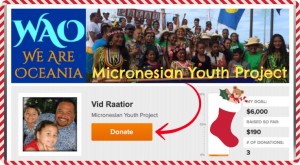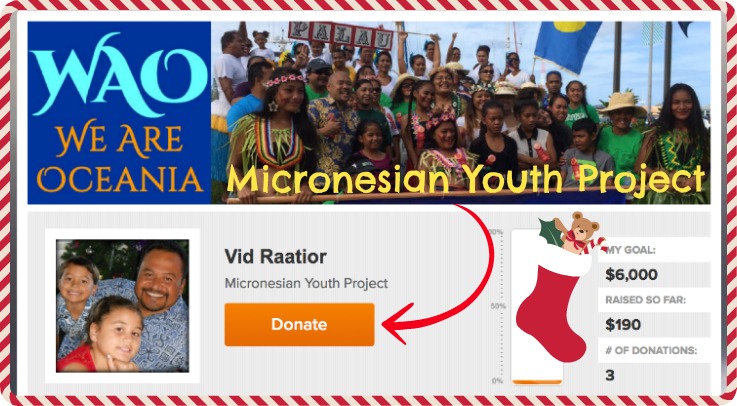 As we prepare for the new year amidst climate change summits and anti-immigrant sentiments from Republican presidential candidates, we pause to reflect on our lives as Micronesians in these United States. In this season of giving, our community continues to suffer from a deficit narrative that unjustly labels us as takers rather than contributors to Hawaiʻiʻs well-being.
As we prepare for the new year amidst climate change summits and anti-immigrant sentiments from Republican presidential candidates, we pause to reflect on our lives as Micronesians in these United States. In this season of giving, our community continues to suffer from a deficit narrative that unjustly labels us as takers rather than contributors to Hawaiʻiʻs well-being.
We know that the majority of our citizens from the Compact of Free Association (COFA) nations of the Federated States of Micronesia (FSM), Republic of the Marshall Islands (RMI), and the Republic of Palau (ROP) are law abiding legal residents of the US who are working hard to earn an honest dayʻs work to provide a better future for their children. Yet media reports tend to focus on the few who need the extra help of social services or trapped in the cyclical struggles of houselessness.
We know from a recent study sponsored by We Are Oceania (WAO) and other Micronesian-serving organizations that Micronesian parents in Hawaiʻi consider the loss of our cultural values as their top concern. Yet we have no cultural or linguistic enrichment programs for our Micronesian children and youth.
We know from the aforementioned report that the Micronesian parents who participated in focus groups on Oahu, Hawaiʻi Island, and Maui consider the aspirations for their children as their next top priority. Yet, I hear far too often from teachers who ask me why Micronesian parents do not care for their children. These uninformed teachers judge this from the absence of Micronesian parents at parent-teacher conferences, Parent Teacher Organization meetings, and other school functions.
I am fairly certain that on any given school campus, we can find many positive role models among our Micronesian youth who hope for a better future for themselves and their families. Yet, the media sensationalizes the few bad coconuts who make bad choices and land in the criminal justice system.
Some of these negative stories are true, but most are downright false fueled only by ignorance and racial discrimination. The media has to do a better job of balanced reporting; politicians in Hawaiʻi must stop blaming Micronesians for the lack of Compact impact fiscal allocations from the federal government. Educators and service providers must understand the diversity of our Micronesian region in order to fully appreciate and respect our childrenʻs unique needs and aspirations.
But most importantly, I hope that in 2016 we Micronesians change the existing deficit narrative by taking responsibility for the betterment of ourselves, our families and the larger Hawaiʻi oʻhana.
We must embrace and teach our children our Micronesian values of respect, reciprocity, family, humility, and faith life. We know these better than public schools so we must actively supplement our kidsʻ education with culturally sustaining after-school or summer enrichment programs.
We Micronesians must rally around our common aspirations for the success of our children by getting involved in our childrenʻs schools. Instead of waiting while our youth continue to lose their indigenous knowledge and become more Americanized, we must sponsor our own Micronesian-focused culture based enrichment programs.
We must unite our efforts to self-advocate for our own community. We must encourage our US-born youth to be fully engaged in their civic duties by registering to vote in state, local, and national elections. Voting is a sure way for political leaders to listen to our community needs.
We can no longer afford to depend only on the government to alleviate poverty. We must work together to create leadership development and job training programs to give our youth the competence to succeed in the workplace. Earning an honest dayʻs work is a dignified way to break that cycle of dependency on government handouts.
Finally, during this Season of Joy and Giving I invite all my fellow Micronesians and our friends in the US and around the world to unite with the We Are Oceania (WAO) organization in our fundraising campaign. WAO is a collaborative project aimed at centralizing the support system for all Micronesian communities, families and individuals in Hawaiʻi sponsored by the Partners in Development Foundation (PIDF).
If you are moved to give Micronesian youth in Hawaii a chance to rise, please consider donating any amount to our Micronesian Youth programs fundraising page on PIDFʻs federally approved fiscal management portal: https://why.pidf.org/fundraise?fcid=582200







